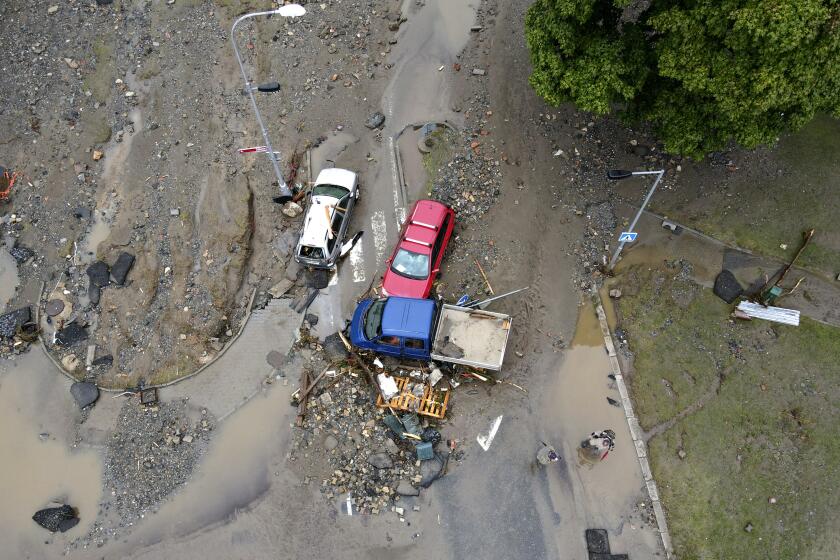A Close Call for PLO Leader
In an incident that boded ill for the interim Palestinian government’s efforts to keep order, gunmen in the Gaza Strip unleashed bursts of automatic-weapons fire Sunday near Palestinian leader Mahmoud Abbas, panicking his bodyguards and leaving two security men dead.
Abbas, 69, was unhurt in the gunfire that erupted just after he and his entourage arrived at a mourning tent in Gaza City in honor of his predecessor as Palestine Liberation Organization chief, Yasser Arafat, who died Thursday.
Abbas and other Palestinian officials played down the significance of the incident, saying it was not an assassination attempt.
It appeared not to have been. Witnesses said the weapons of the gunmen, who were believed to be from Arafat’s Fatah movement, were pointed upward. The brazen gunfire, commonly used as a means of intimidation during factional disputes in Gaza, underscored the danger of a power struggle breaking out in the wake of Arafat’s death, particularly in the volatile seaside territory.
It was also a reminder that Abbas, a moderate who has often said publicly that he opposes violence as a means of pursuing Palestinian statehood, is deeply unpopular among the many young shock troops of the Fatah faction who oppose accommodation with Israel.
Witnesses said that just before the shooting started, a group of young men shouted slogans denouncing Abbas and former Gaza security chief Mohammed Dahlan, who accompanied him. “There’s no honest man here to replace Abu Ammar,” they yelled, using Arafat’s nom de guerre.
Arafat, 75, died in a French military hospital of undisclosed causes. He had fallen ill nearly a month earlier at the Ramallah, West Bank, headquarters where he had spent the last 2 1/2 years under virtual house arrest.
The two dead security men were identified as a member of the Palestinian Authority’s Preventive Security Service and a member of Force 17, the presidential protection unit. It was not clear whether they were killed by shots fired by the militants or by defensive fire from others among Abbas’ bodyguards.
In recent months, even before the onset of Arafat’s final illness, Gaza was the scene of serious factional infighting between allies of Dahlan, a protege-turned-rival of Arafat, and other elements within Fatah. The territory is also a stronghold of Hamas, Islamic Jihad and other militant groups.
Witnesses said Abbas’ bodyguards flung him to the ground after gunmen burst into the mourning tent and began firing. Frightened mourners tipped over plastic chairs as they dived for cover. After a few minutes, the gunmen fled and Abbas’ bodyguards hustled him away.
Speaking to reporters a short time later at his Gaza offices, Abbas asserted, somewhat unconvincingly, that the gunfire was random and “had no relation to my presence here at all.”
“This is a normal occurrence at weddings and funerals,” he said, also pointing to the “intense emotion” surrounding Arafat’s death.
The shooting came hours after the Palestinian leadership, meeting in Ramallah, ratified Jan. 9 as the date for general elections and set rules for the declaration of candidacies for president of the Palestinian Authority, one of the posts Arafat held.
Abbas, having been picked to head the PLO, has emerged as the main power in the interim government, although Rouhi Fatouh, the speaker of parliament, was sworn in as temporary president in accordance with the law. Abbas was formally designated Sunday by the Fatah leadership as its candidate for president.
Israeli officials are worried that in addition to expected infighting in the wake of Arafat’s death, Palestinian militants will make new attempts to stage suicide bombings and other attacks inside Israel.
Army Chief of Staff Moshe Yaalon reportedly told the Israeli Cabinet at its weekly meeting Sunday that a wave of attempted attacks was expected after the conclusion of the Eid al-Fitr, a three-day Muslim holiday that ends tonight.
At the Cabinet meeting, according to Israeli media reports, Prime Minister Ariel Sharon questioned whether the Palestinian interim government could provide sufficient security to hold elections in less than two months.
“Who can make sure that gunmen do not come to the polling places?” Israel radio quoted the Israeli leader as asking.
Israeli leaders also are debating whether approximately 240,000 Palestinians living in East Jerusalem should be allowed to participate in the elections.
Foreign Minister Silvan Shalom argued that allowing them to vote for the Palestinian president would bolster the Palestinian claim to East Jerusalem as the capital of their future state. But Avraham Poraz, the interior minister, said it would be wrong to prevent the Jerusalem Palestinians from taking part in the balloting.
“We’d be criticized by the entire world,” he said.*
Special correspondent Fayed abu Shammalah in Gaza City contributed to this report.
More to Read
Sign up for Essential California
The most important California stories and recommendations in your inbox every morning.
You may occasionally receive promotional content from the Los Angeles Times.










